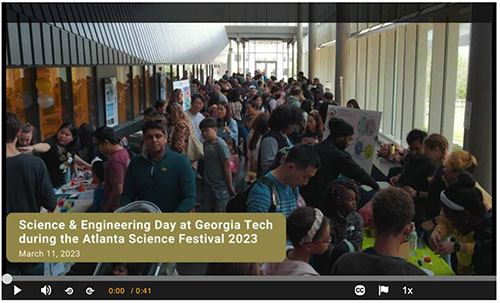Georgia Tech Chips Day
Join us for an in-depth one-day workshop at Georgia Tech, focusing on the latest research and trends in microelectronics and semiconductors. This interactive event will offer an opportunity to learn from and network with experts, academics, and professionals from across the field. The day will include:
ECE Professor Omer Inan to be Featured Speaker at TEDxAtlanta 2023: WE RISE
Apr 06, 2023 —

Professor Omer Inan is set to take the stage at the upcoming TEDxAtlanta 2023: We Rise event on May 19.
Professor Omer Inan is set to take the stage at the upcoming TEDxAtlanta 2023: We Rise event on May 19.
As the Linda J. and Mark C. Smith Chair in bioscience and bioengineering in Tech’s School of Electrical and Computer Engineering (ECE), Inan designs clinically relevant medical devices and systems and translates them from the lab to patient care applications. In his talk, Inan will be discussing his groundbreaking research on wearable healthcare technologies and the potential they hold for revolutionizing the field.
Inan is a member of the prestigious Medical and Biological Engineering (AIMBE) College of Fellows (elected in 2022) for his “outstanding contributions to the non-invasive assessment of the mechanical aspects of cardiovascular health and performance using wearable devices.” Additional achievements include an Academy Award for Technical Achievement from The Academy of Motion Picture Arts and Sciences (The Oscars, 2021), the Georgia Power Professor of Excellence for the College of Engineering (2019), and the National Science Foundation Faculty Early Career Development Program award (NSF CAREER, 2018).
TEDxAtlanta 2023: WE RISE brings together an impressive group of participants from diverse backgrounds, experiences, and perspectives. The speakers include entrepreneurs, activists, educators, artists, scientists, and many other changemakers who have risen above challenges to make a positive impact on the world.
The event's participants will share their stories and insights on how they have overcome adversity, embraced innovation, and challenged the status quo to make a difference in their communities and beyond. Through their talks, they will inspire and empower attendees to rise above their own challenges and take action towards creating a better future for all.
TEDxAtlanta 2023: WE RISE will take place on Friday, May 19 from 9 a.m. – 6:30 p.m. at the Rialto Center for the Arts (80 Forsyth Street Northwest Atlanta, GA 30303). Learn more and purchase tickets at tedxatlanta.com.
Dan Watson
Programmable Self-Assembly of DNA-Based Nanomaterials
Featuring Associate Professor Yonggang Ke, Wallace H. Coulter Department of Biomedical Engineering, Emory University and Georgia Institute of Technology.
Driving Change: Georgia Tech Experts Lead in Electrification of America’s Roads
Mar 21, 2023 — Atlanta

Top: Rich Simmons, Marilyn Brown, Gleb Yushin; Bottom: Valerie Thomas, Hailong Chen, Tim Lieuwen
Idling at a crossroads no longer, the automotive industry is embracing electrification like never before. With more electric vehicles purchased in 2022 than any year prior, consumers are beginning to follow their lead. Yet, while opportunity abounds, new challenges will require an innovative approach to ensure a sustainable and accessible electric future for all.
With historic investments from major players in the EV space, including Rivian, Kia, and Hyundai, the state of Georgia is uniquely positioned to serve as a leader in this effort. As the state's leading research institute, Georgia Tech is on the cutting edge of the movement.
The transportation sector is the largest greenhouse gas emitter in the U.S. at nearly 30%, with passenger vehicles accounting for around 80% of the sector's total output1 as of 2019. Electric vehicles are widely regarded as a budding solution to reduce emissions, but even as both demand and production continue to increase, EVs currently account for around 1% of the cars on America's roadways.
From the supply chain to the infrastructure needed to support alternative-fuel vehicles alongside consumer hesitancy, achieving the goals set by both the public and private sectors — including the Biden Administration's target of EVs making up at least 50% of new car sales by 2030 — will not be easy. Through research and development, policy, and collaboration, Tech experts are working toward finding solutions that will serve as catalysts during this transitionary period for the environment and the way Americans drive.
Steven Gagliano - Communications Officer
Institute Communications
Nano@Tech Spring 2023 Series | Electrocatalysis for Clean Chemical Manufacturing and Environmental Remediation
Featuring Marta C. Hatzell, Associate Professor of Mechanical Engineering at Georgia Tech
Abstract: Of the four major energy-use sectors (transportation, residential, commercial, and industrial), the industrial sector accounts for the largest amount of energy use (~33 EJ/year). This energy use results in nearly 1500 million metric tons of carbon dioxide emissions yearly. The large carbon footprint is due to most modern industrial processes’ reliance on process heat which is often derived from coal, natural gas, and petroleum.
IEN Soft Lithography Short Course
The Institute for Electronics and Nanotechnology (IEN) at Georgia Tech will offer a short course on Soft Lithography for Microfluidics on April 13 - 14, 2023. This course module is designed for individuals interested in hands-on training in the fabrication of microfluidic devices using the soft lithography technique. This two-day intensive short course will be structured to assume no prior knowledge of the technologies by the participants.
Science and Engineering Day Buzzes with Excitement
Mar 13, 2023 —

A young participant that is experiencing virtual reality for the first time at Georgia Tech
More than 1,500 parents and children across the Atlanta metropolitan area attended a jam-packed second annual Georgia Tech Science and Engineering Day held on Saturday, March 11 in conjunction with the tenth annual 2023 Atlanta Science Festival. Located across five campus buildings, more than 40 demonstrations, hands-on STEAM activities, tours, and learning opportunities designed to engage and educate participants were offered by students, staff, and faculty volunteers.
Some of this year’s demonstration topics included battery fuel cells, nanotechnology, DNA, immunoengineering, chemistry, engineering, superconductivity levitation, wastewater treatment, aerospace, space outreach, virtual reality, biology, robotics, computing, 3D printing, paper making, and much more.
A parent attending from Peachtree City said, “we’ve discovered our son has an affinity for math and science. He’s handling tenth grade science level coursework, yet he’s only in the seventh grade and can understand math formulas ahead of his age group. We brought him here to expose him to a variety of technologies and advanced equipment that he won’t see or be exposed to in his middle school. The staff and professors here have been very kind to show him how to use some of the equipment we’ve seen. And his eyes have gotten bigger all day because of these interactions.”
Virginia Howell, director of the Roberts C. Williams Museum of Paper Making in the Renewable Bioproducts Institute at Georgia Tech said, “the paper museum is delighted to be part of the Georgia Tech Science and Engineering Day. It's a great opportunity for people to learn more about the paper museum and get hands-on experience in making a sheet of paper to take home. We offer workshops, classes, and tours to students across the state of Georgia. Kids have been lined up all day to participate at our tables today.”
Demonstrations included how to extract DNA, seeing LIDAR in action, experiencing heat sensing sensors, how x-rays are used, viewing scanning electron microscopes, playing a virtual reality game, experiencing chemical reactions, watching 3D printing, making slime, showing atom-level nano materials in synthesized materials, neuroscience demos, liquid nitrogen experiments, and many more.
Presentation areas were hosted by the Institute for Electronics and Nanotechnology, the Institute for Robotics and Intelligent Machines, and the Institute for Bioengineering and Biosciences who provided valuable space in their buildings to house demonstrations. The Ford Environmental Science & Technology Building and Molecular Science & Engineering Building also donated space for demonstrations.
Another tour offering during Science and Engineering Day was the Flowers Invention Studio at Georgia Tech which offers more than 5,000 square feet of industrial makerspace equipment.
“We are the largest student-run maker space in the nation,” said Lillian Tso, president of the Invention Studio and a fourth-year mechanical engineering student. “We house industrial grade equipment for prototyping and manufacturing—we support anything that students want to build. We're open for all students of all majors of all years. They can use our equipment for free which includes CNC machines, more than 50 3D printers, waterjets, laser cutters, and many other professional-level tools. This is our first year participating in the Georgia Tech Science and Engineering Day. We wanted to do a lot more outreach to the Georgia Tech campus and the greater Atlanta community."
Lucas Garza, president-elect of the Invention Studio, added, “we’ve had a busy day offering tours of our studio throughout the festival.”
Located in the mezzanine of the Marcus Nanotechnology Building, Ethan Sirak, a fourth-year aerospace student with the Georgia Space Grant Consortium, was providing kids with exposure to space facts and allowing them to perform crafts related to planets and space. The consortium is an organization under NASA which aims to promote STEM exposure to kids of all ages. He also assists with the Aerospace Engineering Outreach Program. He was partnered at his hands-on learning table with Bill McNutt Jr., a senior aerospace engineering student.
A young participant from Suwanee, Georgia, said, “I want to go to school at Georgia Tech because of aerospace engineering. I want to go on good adventures in future space flight and design things.”
His mom, a sixth-grade science teacher added, “I love coming to science fairs to get new ideas for my students and I love to bring my family because we just have a great time. This is our very first science fair here at Georgia Tech. We've been to ones in north Georgia because that's pretty close to where we live. But when we saw this was available, we're like, yeah, we're coming down to Tech for this today—and having a great time.”
While attendees were able to get a peek into one of the nation’s most research-intensive universities, the event also allowed the many researchers and students participating the opportunity to share their science and engineering work with the public.
One of the more unique tables was manned by Alison Reynolds, an instruction archivist with research services in the Georgia Tech library. She was displaying a selection of unique items from Georgia Tech’s science fiction archives and special collections. She said, “we’ve been teaching with science fiction since 1971 and our collection is now one of the largest science fiction collections in the United States. We wanted to display part of our special collection.”
“I had several Georgia school systems reach out to me that were interested in attending this event,“ said Leslie O 'Neill, education outreach manager with the Southeastern Nanotechnology Infrastructure Corridor (SENIC) at Georgia Tech. “Georgia Tech plays a vital part in its community. We wanted to showcase the campus; the student, faculty and staff research; and the amazing science and engineering being done. We’ve had a fantastic turnout this year for this event.”
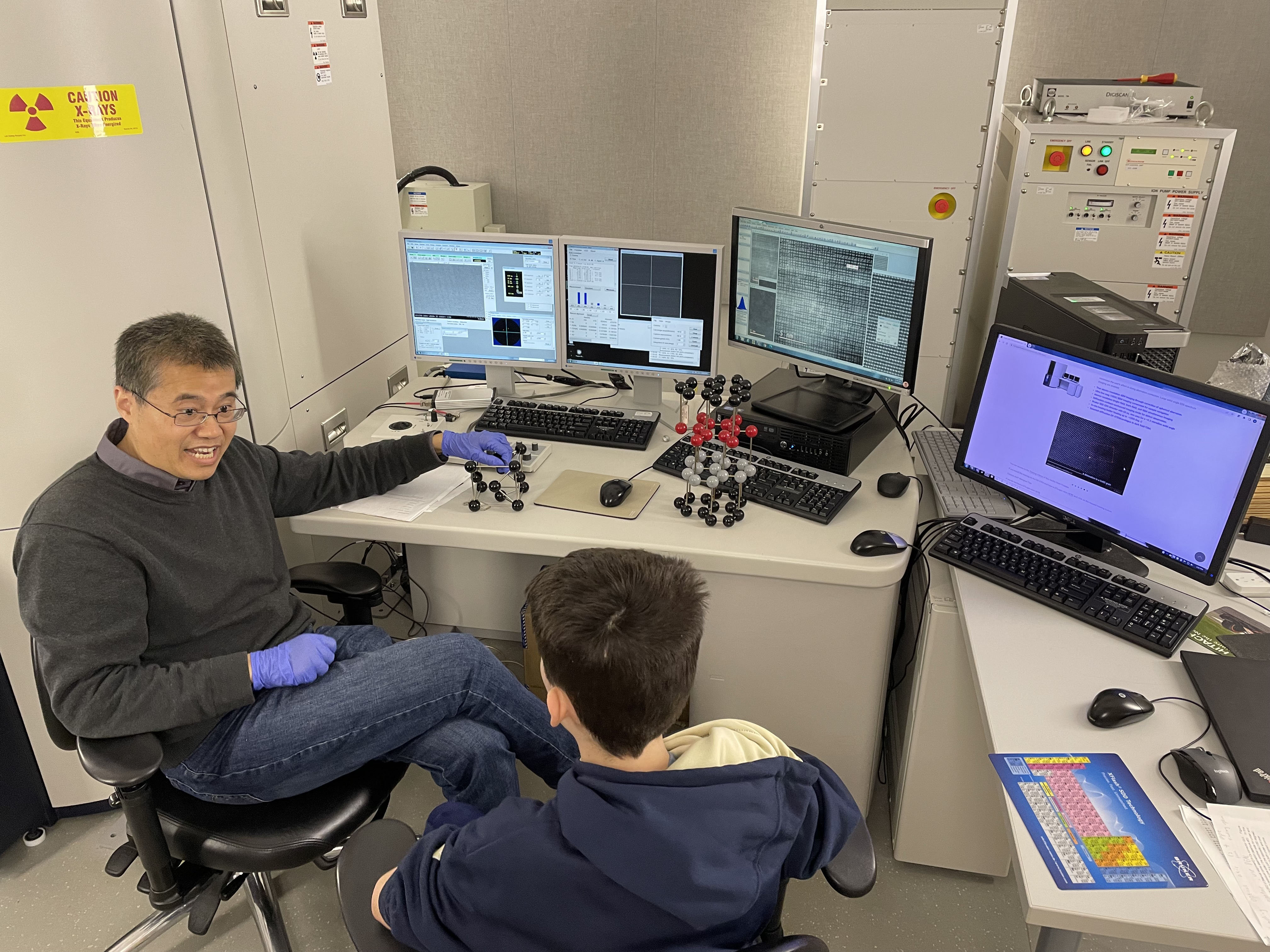
Yong Ding, principal research engineer, teaching a young student about microscopy.
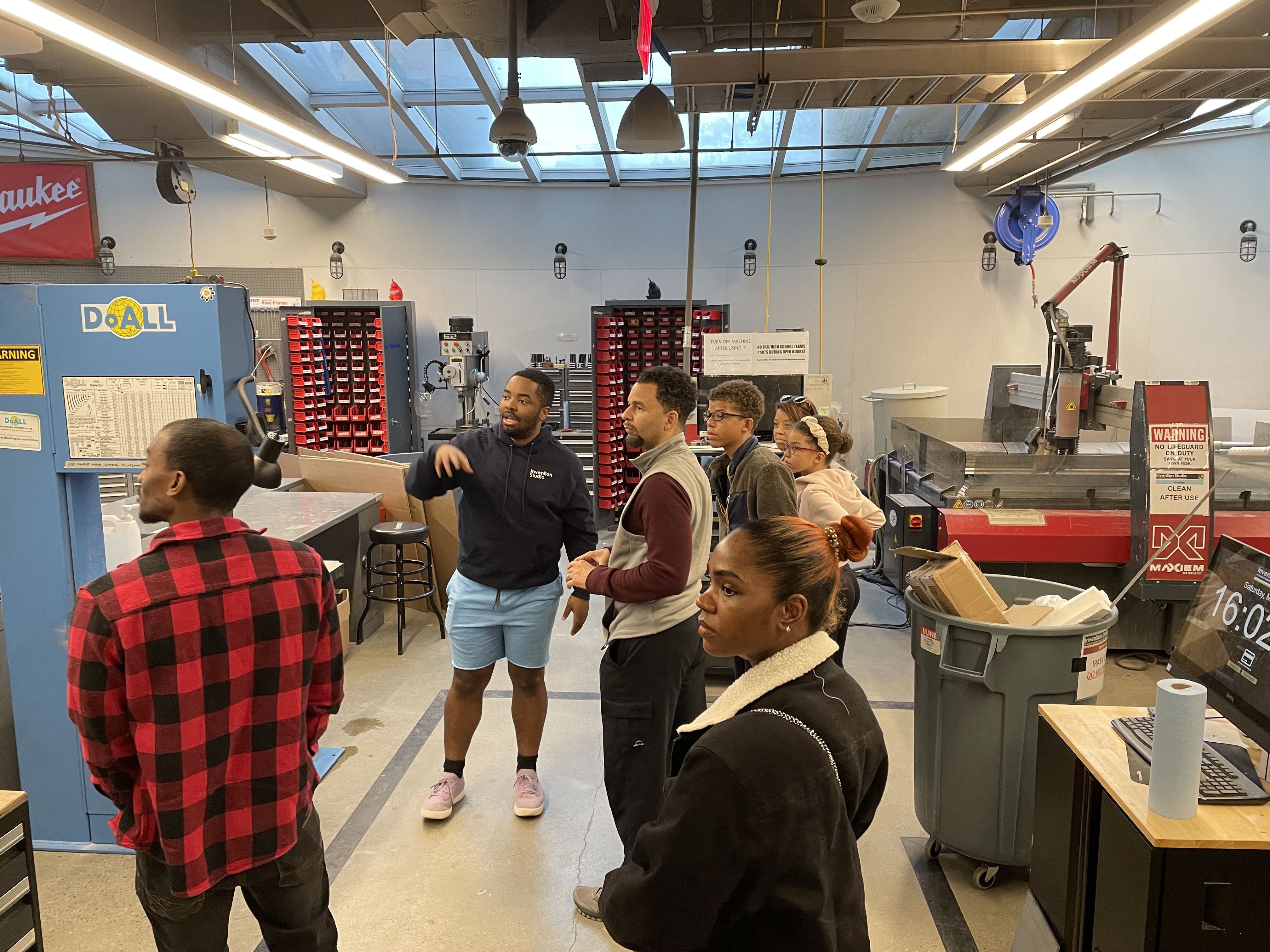
Flowers Invention Studio tour in progress. The water jet machine is shown on the upper-right side.
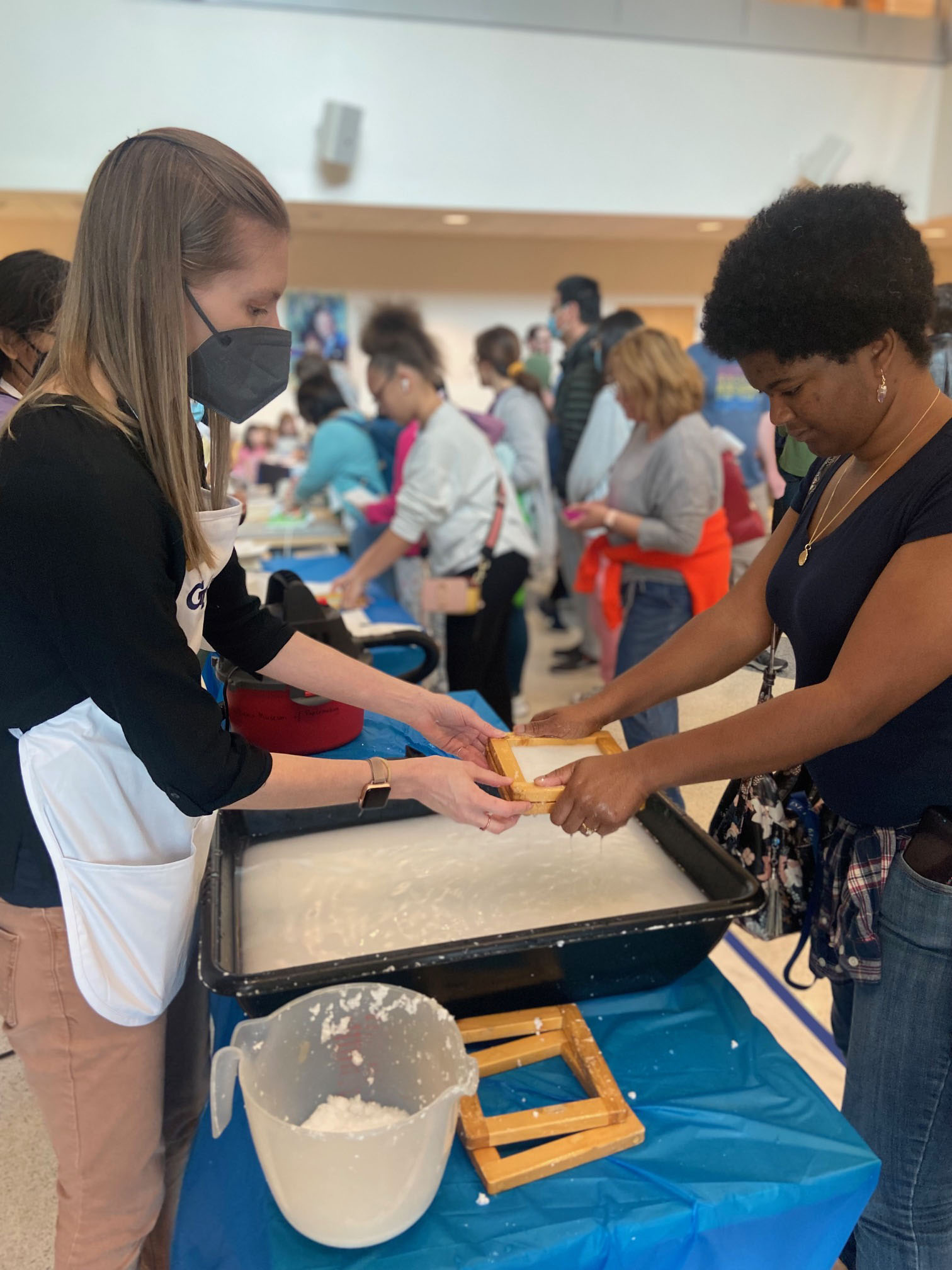
Anna Doll, education curator at the Robert C. Williams Museum of Papermaking, guiding visitors as they make paper.
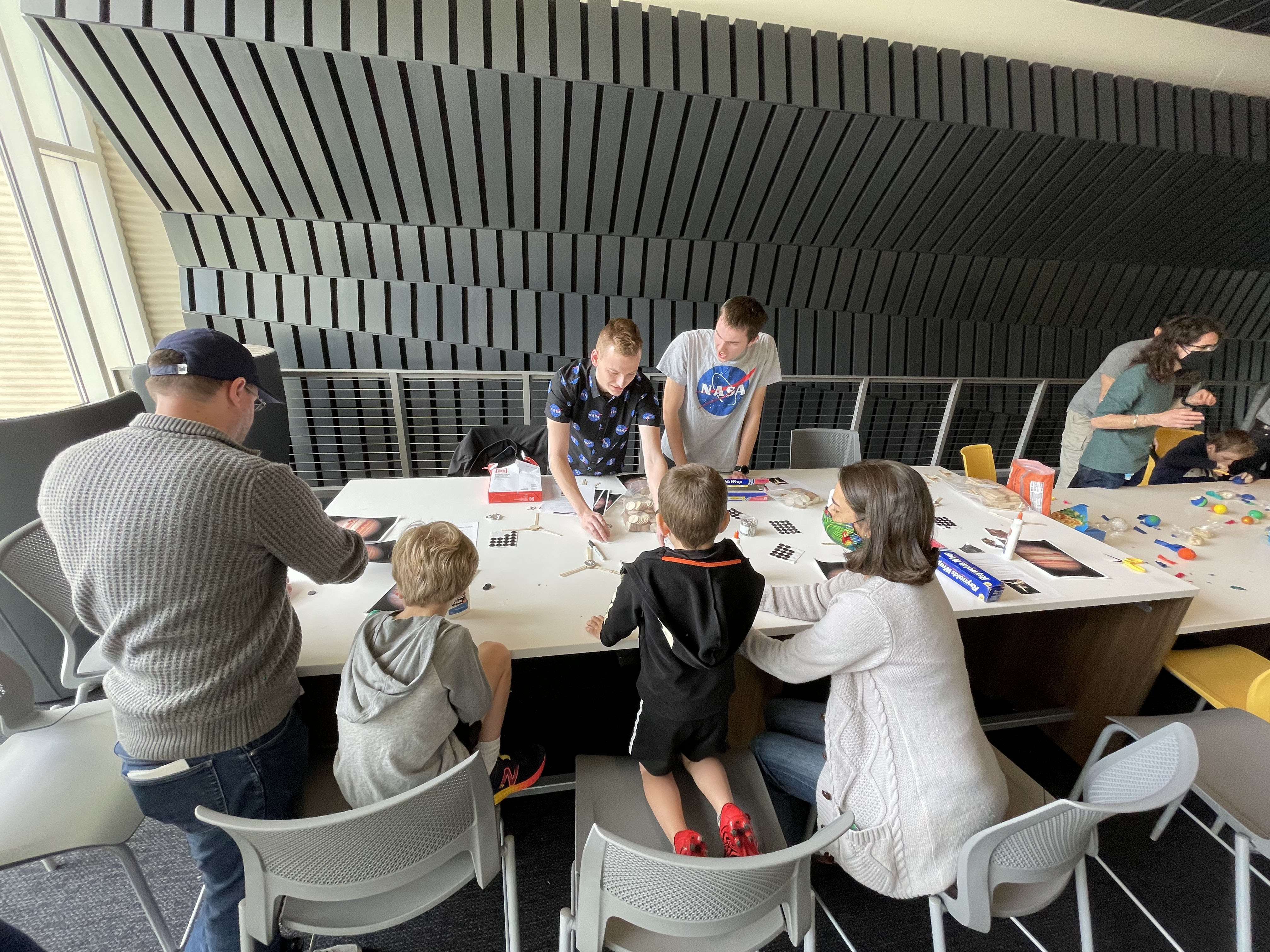
Aerospace students Ethan Sirak and Bill McNutt Jr. with the Georgia Space Grant Consortium teaching kids space facts and allowing them to perform crafts related to planets and space.
ASPE 2023 Spring Topical Meeting on Precision Micro-Nano Technology
April 20-21, 2023
Call for Papers
The 2023 Spring Topical Meeting will connect precision micro-nano engineering experts from academia, industry and national labs, with each group finding value in attending this topical meeting.
Nano@Tech Spring 2023 Series | An Engineer’s Perspective on Antiferromagnetic Spintronics
Featuring Assistant Professor Shaloo Rakheja, University of Illinois at Urbana-Champaign
Abstract: Antiferromagnets (AFM) materials have ordered spin moments that alternate between individual atomic sites, which gives them a vanishing macroscopic magnetic signature and picosecond intrinsic timescale.
Faces of Research: Meet Chaouki T. Abdallah
Feb 16, 2023 — Atlanta, GA

The $1.3 billion research enterprise at Georgia Tech is the embodiment of a commitment the advancement of technology and betterment of the human condition. Georgia Tech's research enterprise through offerings such as the Enterprise Innovation Institute, the Georgia Tech Research Institute, Commercialization, and Interdisciplinary Research Institutes, to solve the most pressing challenges in a host of sectors, including computing, engineering, design, the sciences, liberal arts, and business.
This installment of the Faces of Research Q&A series is with Chaouki T. Abdallah, Executive Vice President for Research at Georgia Tech.
What is your field of expertise and why did you choose it?
My field of expertise is Systems Theory, and my degrees are all in Electrical Engineering. I chose it because it was heavily mathematical but can also be applied across multiple fields (aerospace, chemical, mechanical, electrical, biology, etc.).
What makes Georgia Tech research institutes unique?
Our IRIs (Interdisciplinary Research Institutes) connect research across colleges but what makes them even more impactful is their intra-connectivity. Problems that are even too big for one IRI, are being solved by researchers across multiple ones.
What impact is your research having on the world?
My own research impact has been mostly through my students. However, I did use my research in systems and network science to study and improve the complexity of college curricula, leading to 150% improvement in the four-year graduation rate and tens of millions of dollars in savings for students.
What is the most profound advice you ever received?
Pick the hill you’re willing to die on.
What is something you wished you knew as a budding researcher that everyone considering research as a career should know?
The joy of knowing something is eclipsed by the joy of explaining it to others.
What song or album best describes you?
"With a Little Help From My Friends" by The Beatles.
Péralte C. Paul
404.316.1210
peralte.paul@comm.gatech.edu

